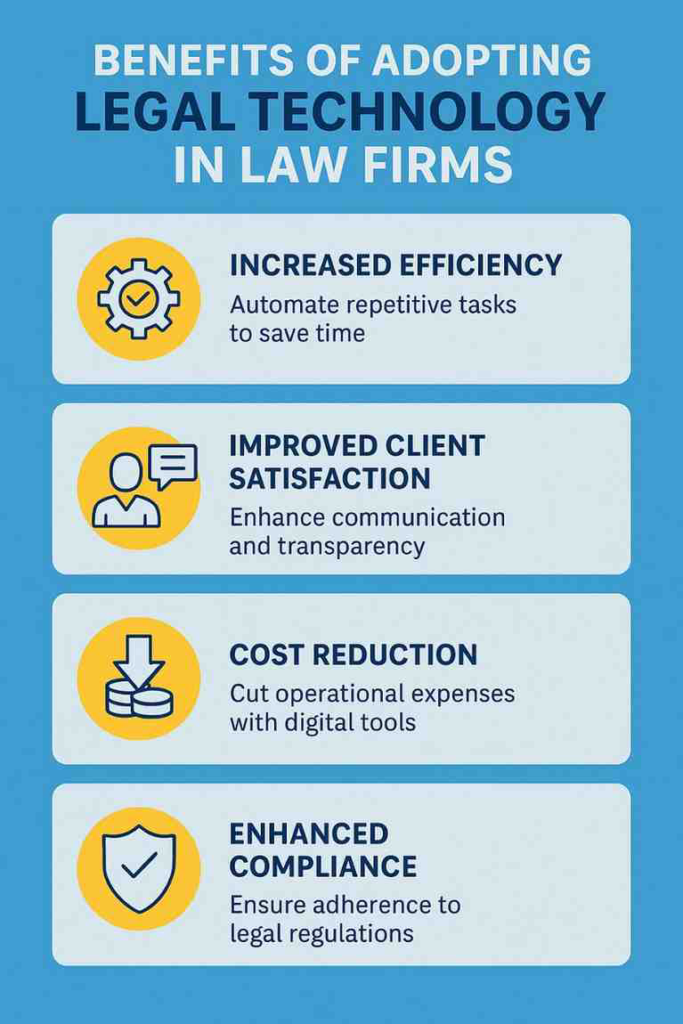In today’s busy legal world, it’s tougher than ever to stay competitive. Legal technology, or legal tech, is no longer just a trendy word—it’s a key to making law firms work better, keeping clients happy, and being successful. CNLawBlog has been a leader in showing how legal professionals can use tech to improve their work and stay ahead.
This guide is for law firms thinking about adding legal technology. We’ll look at the main problems legal tech can solve, share real-life stories, and offer expert advice to help you decide how tech can change your practice. We’d love to hear from you too—how has legal tech affected your firm? Share your stories in the comments below or on social media.

What Is Legal Technology, and Why Does It Matter?
Legal technology includes the software, systems, and tools that are intended to streamline, automate, and enhance the practice of law. From document management and legal research to billing and case management, legal tech tools can save law firms time and money while enhancing client results.

For law firms, adopting legal technology can:
- Increase efficiency by automating repetitive tasks.
- Improve client satisfaction through better communication and faster responses.
- Reduce overhead costs by replacing manual processes with automated systems.
- Ensure compliance with legal and ethical standards, particularly in areas like data security and privacy.
While these benefits are well-documented, understanding which tools to use and how to integrate them into your firm’s workflow can be tricky. What tools has your firm embraced? Let us know in the comments or share your insights on social media.
Common Problems Legal Technology Solves
Many law firms struggle with similar operational inefficiencies, and legal technology can often provide the solution. Here are a few examples of common issues and how legal tech helps solve them.
1. Document Management
Problem: Handling lots of legal documents by hand can be hard and mistakes are easy to make. Old ways of keeping these documents, using paper or digital files, often lead to wasted time, missing papers, and sometimes breaking important rules.
Solution: Cloud-based software like Clio and NetDocuments can help. These tools let you store, manage, and find documents easily, so lawyers can work from anywhere, even from home. They also allow team members to collaborate at the same time and have a version control feature built in, which helps prevent mistakes.
Real-World Example: Baker McKenzie, a major global law firm, decided to use NetDocuments for managing their documents. This change cut down the time it took to find documents by 40%. By moving to cloud-based systems, they made their work processes more efficient. This shift allowed them to concentrate more on key tasks like creating strategies for their clients.
Expert Insight: Josh King, the General Counsel at Zola Media, points out that the secret to boosting productivity in law firms is adopting cloud-based tools. These tools enable easy document access from any location and include vital security features to protect sensitive information.
2. Legal Research

Problem: Legal research can be a long and tedious task. Lawyers often need to go through mountains of information to find the right cases or laws. This process is not quick and can slow down how much work the firm can complete.
Solution: Platforms like Westlaw Edge and Lexis+ use artificial intelligence to make this research much faster and easier. These platforms can quickly search through large sets of data to find what is relevant. They use machine learning, so lawyers get better and more precise insights. Some platforms can even predict the outcomes of cases by looking at past data.
Real-World Example: ROSS Intelligence is a great example of how AI can help with legal research. Law firms using ROSS report that their research time is cut by 50%. This software uses AI to look at large legal databases and find important case law. This process helps law firms find the information they need much more quickly.
Expert Insight: Daniel Martin Katz, a professor at Michigan State University and an expert in legal technology, explains that AI tools do not just make research faster. These tools also change the way lawyers handle cases by providing new data insights that were not available before.
3. Client Communication and Expectations
Problem: Many clients often feel unhappy and frustrated because they do not know the latest updates about their case. Lawyers are usually very busy and do not have enough time to call or email updates to their clients frequently.
Solution: Client portals like Clio Connect and MyCase can solve this problem by giving clients secure access to important case information. These platforms allow clients to view their documents and invoices at any time. Additionally, automation tools can send regular updates to clients, so they stay informed about their cases without needing constant direct contact with their lawyers.
Real-World Example: MyCase, used by smaller and medium-sized law firms, offers clients real-time access to case progress, documents, and billing details, improving client engagement and satisfaction. The platform’s integration with calendar and payment systems also reduces administrative work, providing clients with an all-in-one platform.
Expert Insight: Mark Cohen, founder of Legal Mosaic, explains, “Client expectations are higher than ever. Technology empowers law firms to meet those expectations by offering transparency and convenience, which ultimately boosts client retention.”
How Legal Technology Can Transform Your Practice

The benefits of legal technology are clear, but many law firms may still hesitate to adopt new tools. CNLawBlog has seen firsthand how firms that embrace legal tech experience tangible improvements in efficiency, client relationships, and bottom-line results. Here’s how it can transform your practice:
1. Increased Efficiency
Through automating clerical tasks like billing, document management, legal research, and time tracking, legal tech generates time for attorneys to concentrate on higher-value activity—client counsel, strategy formulating, and case preparation.
2. Better Client Outcomes
Less time to respond, better information, and increased transparency yield greater client satisfaction. Clients feel more engaged and assured about their representation when they can follow the progress of their case in real-time.
3. Cost Savings
Implementing legal technology, for instance, can assist law firms in lowering overheads. For one, a shift to cloud computing can save firms from the expense of having on-premises IT infrastructure, whereas automation of software can save money in the long run by lessening the requirement for administrative personnel.
4. Improved Security and Compliance
Data security is crucial in the legal field. Legal technology tools often come with built-in compliance features to help law firms meet regulatory requirements like GDPR and HIPAA. Encrypted cloud storage and secure document sharing ensure that sensitive client data remains protected.
Real-World Example: Baker McKenzie and Legal Technology
Baker McKenzie is an excellent example of the productivity gain brought about by legal technology. The firm took on NetDocuments to manage documents and ROSS Intelligence to do research, thereby automating processes, enhancing collaboration, and decreasing document retrieval time by 40%. These transformations enabled the firm to spend more time on strategic client work and less on paperwork.
As Lester B. Thomas, a Baker McKenzie partner, explained, “Adopting legal technology isn’t just about staying competitive; it’s about providing our clients with faster, more accurate services.”
Conclusion: Why Your Firm Should Embrace Legal Technology
The case for adopting legal technology is clear. Whether you’re looking to streamline workflows, improve client communication, or stay ahead of the competition, CNLawBlog provides insights into how the right tools can revolutionize your practice.
Law firms can improve their operations and put more focus on their clients by using helpful technology tools. These include platforms that use AI to assist with research, online systems to store and manage documents, and solutions that automatically handle billing. By doing this, law firms can tackle common problems, making their operations smoother and more secure.
Ready to take the next step?
Let us know in the comments how your firm is planning to incorporate legal tech or share your journey on social media. Don’t forget to sign up for our newsletter for more insights and updates.
About the Author:
John Doe is a legal technology consultant with more than 10 years of experience assisting law firms in the adoption of cutting-edge technology solutions. He has assisted more than 50 firms in streamlining their operations and enhancing client satisfaction through the adoption of cloud-based solutions, AI-driven research tools, and document management systems. John is a well-known thought leader in the legal tech area and is a common speaker at industry events and webinars on the future of legal practice automation. His background involves counselling firms ranging in size from small boutique practices to large multinational law firms.
Engage with Us on Social Media:
Follow us on LinkedIn, Twitter, and Facebook for more updates on the latest in legal technology.
Take Action!
We’ve created a step-by-step checklist for law firms to begin implementing legal tech in their practice. Download it today to get started!
Download the Legal Tech Implementation Checklist
Poll: What Legal Tech Tools Are You Using?
We want to know: Which legal tech tool has made the biggest impact on your firm?
Vote now in our poll and join the conversation below!
For more insights into legal technology and how it can transform your practice, visit CNLawBlog’s homepage where we share the latest updates, case studies, and expert advice tailored to law firms.
Stay updated on the latest trends and insights in legal technology by visiting HeadNewsNow. We cover the most recent developments to keep you ahead in the legal tech world.



